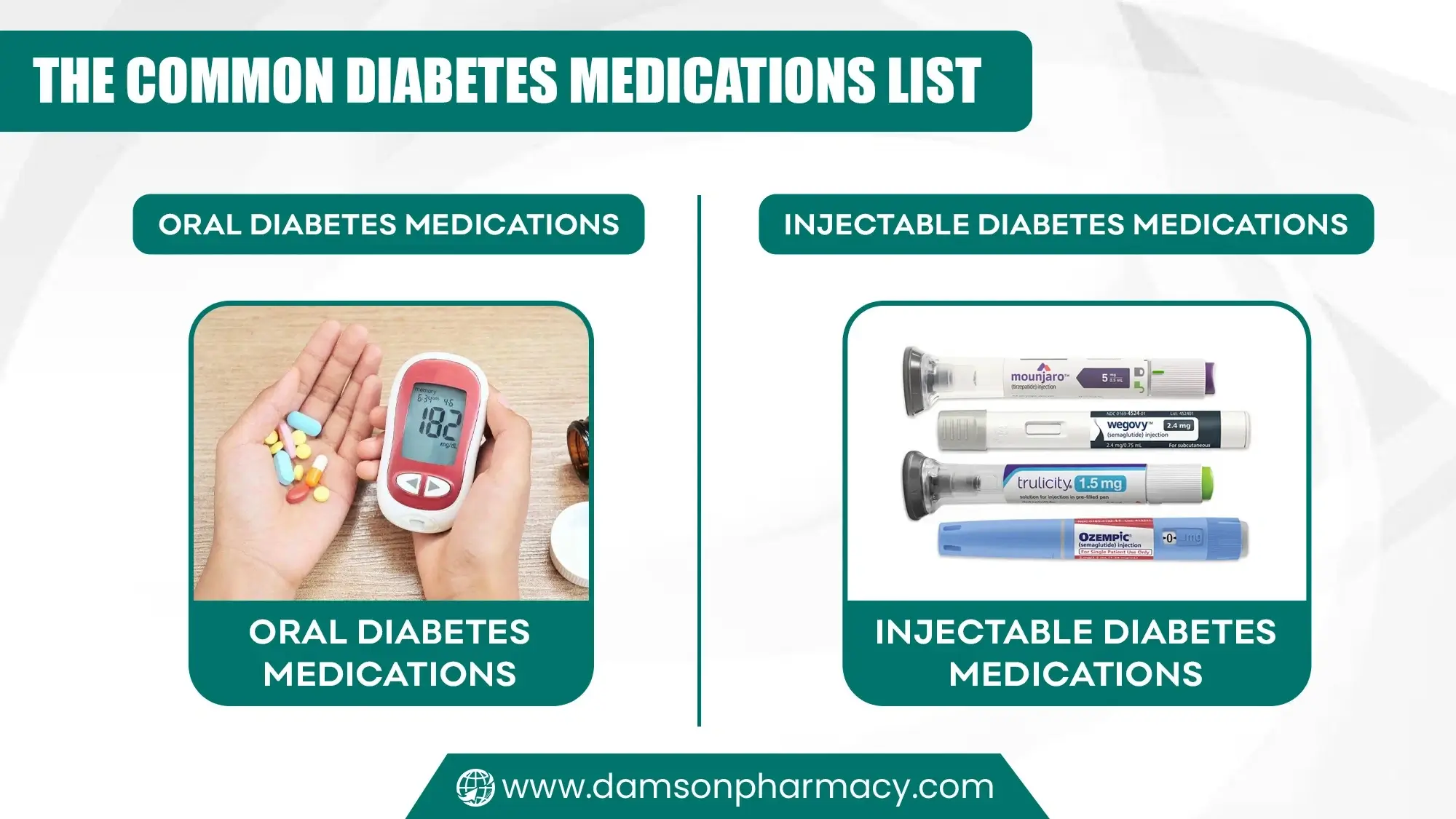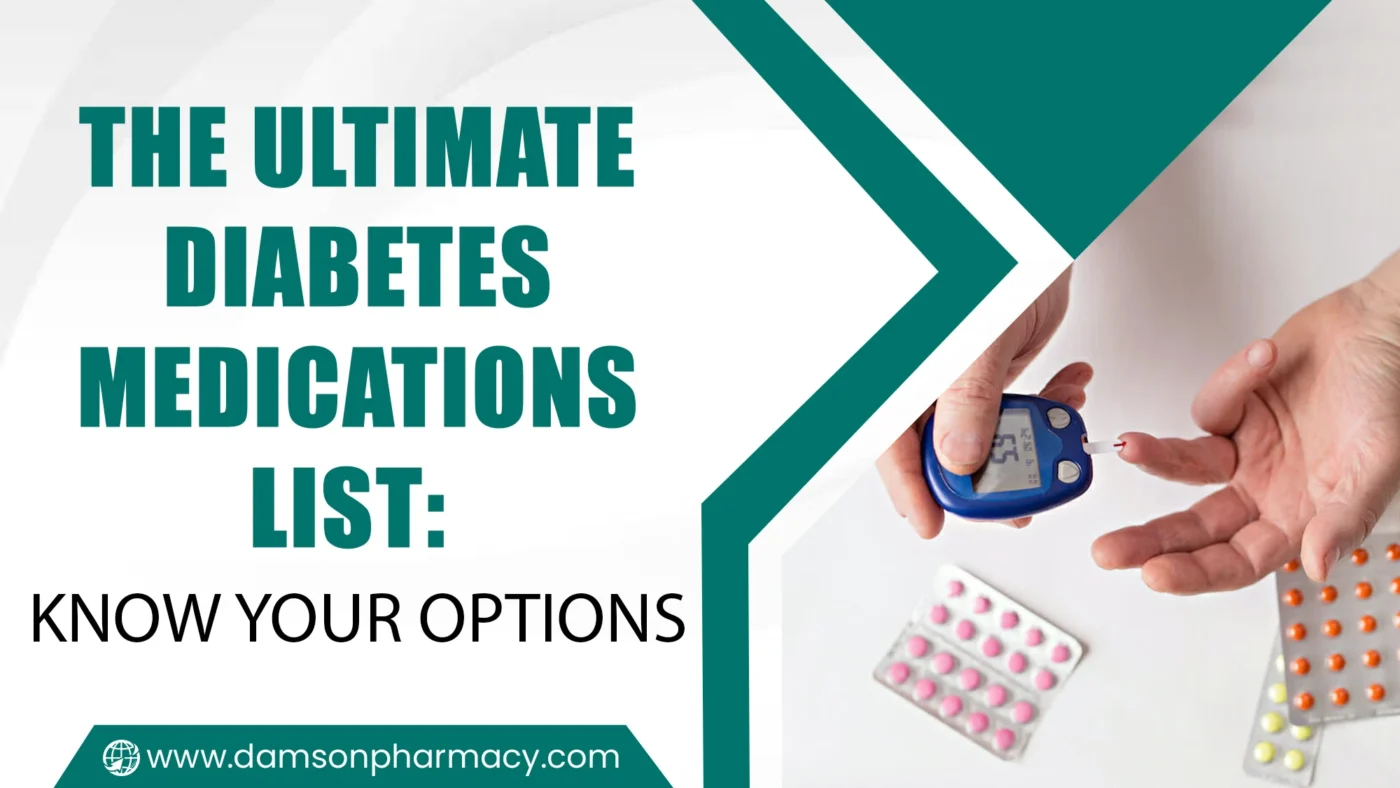The Ultimate Diabetes Medications List: Know Your Options
In the world, thousands of people are victims of Diabetes. Fortunately, several effective treatment options are also available on the market. People use a variety of Diabetes medications to effectively manage Diabetes.
Treating and managing Diabetes requires a comprehensive approach, including a diet plan, regular physical activity, and the right diabetes treatment. Such strategies may be combined to help manage blood sugar effectively.
Diabetes is progressive, and the effectiveness of drugs decreases with time. In such situations, changes in drugs, which include the addition of insulin to the regimen or combination therapy, may be successful. Let’s read this article to read about the new and most recent Diabetes measurements which give positive results.
Understanding Diabetes Medications
Medications for Diabetes are critical for normalizing the blood sugar level of the patient. Such drugs act by mechanisms such as insulin sensitivity, enhancement of insulin production, or glucocorticoids, reducing the concentration of glucose in cells.
It is up to the type of Diabetes, as well as the individual health conditions and the way the body reacts to a certain treatment, to choose the medication.
The Common Diabetes Medications List

1. Oral Diabetes Medications
Alpha-Glucosidase Inhibitors
Alpha-glucosidase inhibitors are used to treat Diabetes and help lower blood sugar levels by stopping and blocking the breakdown of starch and some forms of sugar in the intestines. Starch is a carbohydrate in foods such as potatoes, bread, and rice.
Carbohydrates increase blood glucose levels the most compared to other nutrients you get from food. Some side effects of alpha-glucosidase inhibitors may include gas, bloating, and diarrhoea.
DPP-4 Inhibitors (Gliptins)
The DPP-4 inhibitors (gliptins) are able to lower the levels of blood sugar because they prevent the breakdown of the compound GLP-1 in the body. GLP-1 itself lowers levels, but it normally degrades and stops working extremely fast.
By disrupting this process, the DPP-4 inhibitors allow GLP-1 to remain active in your body for an extended period of time and only reduce blood sugar levels when the level in the body is high. Headache and gastrointestinal problems are among the potential side effects of DPP-4 inhibitors.
SGLT2 Inhibitors
SGLT2 inhibitors are diabetes medications that help lower blood glucose levels by removing extra glucose from your body through the urine. Glucose in your blood passes through your kidneys. From there, glucose can pass into your urine or return to your body. SGLT2 inhibitors block your body’s ability to reabsorb glucose.
Side effects of SGLT2 inhibitors may include urinary tract infections (UTIs) and vaginal yeast infections. They can cause a serious complication called diabetes-related ketoacidosis (DKA), but this happens rarely.
Metadoze IPR 850
Metadoze IPR 850 uses primarily to treat Diabetes. It contains metformin, which works by reducing the production of glucose and improving the body’s sensitivity to insulin. This drug helps lower blood sugar levels and is often prescribed when diet and exercise alone are insufficient.
Adglim MP2
Adglim MP2 is a combination medicine used to treat Diabetes. It combines glimepiride and metformin, acting synergistically to improve insulin secretion and reduce glucose production, thereby effectively controlling blood sugar levels.
Biguanides
Biguanides lower the levels of blood glucose by decreasing the glucose production and release by the liver into the blood. They also assist in reducing blood glucose by sensitizing your muscle tissue to insulin to absorb glucose for energy. Side effects may include diarrhoea, tummy upsets, and a metallic taste on the palate.
Abvida M 50/1000
Abvida M 50/1000 combines sitagliptin and metformin to treat Diabetes. Sitagliptin boosts the body’s natural incretin hormones by increasing insulin secretion and lowering glucagon levels, while metformin reduces liver glucose production.
Metafort G 853
Metafort G 853 is used to treat Diabetes, especially when diet, exercise and single therapy do not provide adequate glycemic control. It combines glimepiride and metformin, which work together to effectively lower blood sugar levels.
2. Injectable Diabetes Medications
GLP-1 Agonists
Glucagon-like peptide 1 (GLP-1) agonists are Diabetes medications that work by mimicking an intestinal hormone called GLP-1. This has several effects, including triggering the release of insulin after a meal, reducing the glucose production in the liver, and slowing the rate of emptying the stomach.
Together, these effects can help improve blood glucose levels with a low risk of hypoglycemia. GLP-1 agonists can also cause weight loss, making them a good choice for people with Diabetes who are trying to lose weight.
Insulin
Insulin is the injectable treatment of Diabetes in which we inject insulin into the body. There are several types of insulin, depending on how fast they work and how long they work. There are also different strengths and mixes of different types of insulin. Low blood sugar – or hypoglycemia – is the most common side effect.
Dexamethasone Injection
Dexamethasone injection is used in the treatment of Diabetes and used to reduce inflammation and suppress the immune system in various conditions. However, in patients with Diabetes, it can cause an increase in blood sugar levels. Therefore, its use requires careful monitoring of blood glucose to prevent hyperglycemia.
Amylin Analogs
The amine analogues mimic a hormone called amylin, which is used to treat Diabetes. This class protects glucose levels from too high a rise after a meal. It slows the movement of food through the stomach.
It can also reduce your appetite and give you a feeling of fullness, which can lead to weight loss. Nausea is a common side effect that usually improves over time.
Diabetes and Erectile Dysfunction (ED)
Erectile Dysfunction (ED) is a common problem among sufferers of Diabetes. High blood sugar may affect the blood vessels and nerves, resulting in problems both in acquiring and sustaining an erection.
Lack of proper blood flow and nerve injury prevents the normal response of the body. The management of Diabetes and ED can reduce the probability of ED. Blood sugar levels are consigned to be under control if one takes proper medications, engages in regular exercise and makes the choice of healthy diets, and the body will have good circulation and nerve function.
On the other hand, the fact is that by seeking medical advice, one is guaranteed the perfect treatment plan.
Conclusion
Diabetes needs constant effort and treatment. Diabetes medications have an important role in managing blood sugars, but a healthy lifestyle is of similar importance. Balanced nutrition, regular exercise and routine medical examinations help maintain stability and prevent complications.
Over time, insulin supplements or combination therapy may need to be modified while Diabetes is being treated. Gaining information about new drugs and treatment methods ensures better treatment of Diabetes. If people manage and recognize their condition well, they can lead a healthier life while managing their condition well.
Reference
- https://www.kdhe.ks.gov/DocumentCenter/View/12498/342-Gastrointestinal-Disorders-PDF
- https://www.novomedlink.com/content/dam/novonordisk/novomedlink/new/diabetes/patient/disease/library/documents/low-blood-sugar.pdf
- https://www.researchgate.net/publication/5460175_Erectile_Dysfunction

